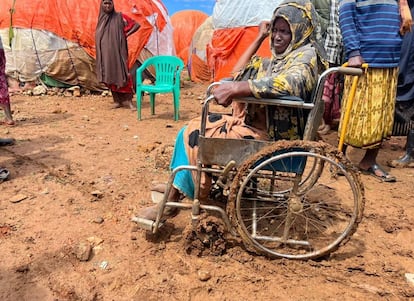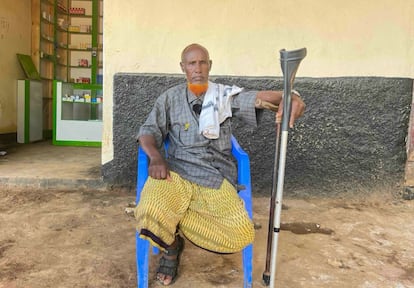First drought, then floods: Disabled Somalis, trapped by climate disaster
Torrential rains in Somalia have left more than a million people displaced, struggling to survive in camps where persons with special needs face cholera and other diseases

“We can’t sleep because our rooms are flooded. Besides, this place is full of snakes and mosquitoes and the water is polluted due to the sewers and the filth,” says Boley Ma’alin Abikar, an 80-year-old blind woman who lives with two children and several grandchildren, most of them also with some type of disability, in the Al Baraka displaced persons camp, outside the city of Baidoa, in southwestern Somalia.
When the floods reached the place, everyone who could fled to safer, higher ground. However, some 800 families remain trapped in this camp. The heavy rains that began in October have already left at least 118 dead and affected more than 2.4 million people in Somalia, according to the United Nations. The impact of these rains was heightened by the climate crisis: the torrential rainfall that punished cities, towns, fields and farms came shortly after the country was hit by the worst drought in the last 40 years.
Earlier this year, Abikar’s family fled more than 125 miles from their home in Qoryoley after the devastating drought that wiped out their 260 cows and goats. They were also escaping from the Islamist group Al Shabab, which controls a large part of the country and to whom they had to pay taxes that were impossible to bear, especially after the drought. These floods have forced 1.2 million people to leave their homes, according to UN data, based on official Somali figures. The total number of displaced people in this African country has already reached four million; more than 20% of the population.
Abikar’s orange scarf is the same color as the plastic that covers the makeshift shelters of Al Baraka, located in a crater-shaped depression. Her daughter, Batulo Mohamed Ibrahim, does not move from her wheelchair. Her clothes are faded and ragged, and her feet are covered in mud. Her legs and arms are deformed and she has never been able to speak. Before the floods, her relatives used to take her to the city, where she would beg in order to contribute some money to the family. Now she is trapped: pushing her wheelchair through the thick, heavy mud is simply impossible. Just moving her a few feet takes three or four people. Like her, other displaced people from the countryside used to live off the charity they received in the center of Baidoa. Now they are helpless, unable to go out to look for food, drinking water, medicine, or other essential items.
Abikar also lives with her son, Mohamed Ibrahim, his wife and their 10 children, all of whom were born with disabilities. Some are blind, others have special physical needs and others suffer from mental problems. Ibrahim used to be able to find work in the city as a doorman and cleaner, but now he is unemployed.
The longer Abikar’s family stays in the camp, the greater the risk of contracting water-borne diseases. The United Nations says that 384 informal settlements in Somalia have been affected by flooding in the Baidoa area, endangering more than 250,000 people displaced by war and drought. The UN, which has described these as the floods of the century, has warned of a 70% surge in cholera cases in the country in the last three weeks.
An emergency with no funding
With the conflicts in Ukraine and Gaza absorbing most of the international attention and resources, humanitarian agencies are struggling to fund emergency responses in countries like Somalia, which has endured 35 years of conflict.
The 2023 Somalia Humanitarian Response Plan, which requires $2.6 billion to help the country’s 7.6 million most vulnerable people, has only been 42% funded. On December 3, the UN estimated that aid had reached approximately 820,000 people, around 30% of those affected by the floods. Some areas remain inaccessible because they are controlled by Al Shabab, have been affected by the conflict, or have difficult access conditions, as is the case of the Baidoa camp. So far, no humanitarian agency has provided aid to these families.

Mustaf Salad Ali, appointed by the government as responsible for looking after people with disabilities in the southwest of the country, knows the difficulties faced by the camp’s residents. “Some can’t see or hear. Others can’t move. So they can’t escape the terrible floods; they cannot even realize that they are coming. The community and the government have to work together to help them,” he says, aware that the authorities are overwhelmed with the help they must provide to those affected by the rains.
His words offer little comfort to people like Ibrahim Ali Jesow, who was born with leg malformations. He cannot leave the camp because his crutches sink in the mud. Before, he used to earn a living teaching the Koran to children with disabilities. “I taught about 50 students in a makeshift classroom. Their parents paid me whatever they could. Some gave me [two or three dollars] a month; others didn’t pay me anything,” he recalls. “Now, the classroom has been washed away by the floods, so the children can’t learn, I can’t teach and I can’t make a living,” he laments. “We don’t have water to drink or to wash before praying. We are at great risk of contracting diseases from the contaminated water we are forced to drink.” Buying water in the countryside costs around $0.50, something most would not be able to afford even if they were able to make their way to the places where it is sold.
Sign up for our weekly newsletter to get more English-language news coverage from EL PAÍS USA Edition
Tu suscripción se está usando en otro dispositivo
¿Quieres añadir otro usuario a tu suscripción?
Si continúas leyendo en este dispositivo, no se podrá leer en el otro.
FlechaTu suscripción se está usando en otro dispositivo y solo puedes acceder a EL PAÍS desde un dispositivo a la vez.
Si quieres compartir tu cuenta, cambia tu suscripción a la modalidad Premium, así podrás añadir otro usuario. Cada uno accederá con su propia cuenta de email, lo que os permitirá personalizar vuestra experiencia en EL PAÍS.
¿Tienes una suscripción de empresa? Accede aquí para contratar más cuentas.
En el caso de no saber quién está usando tu cuenta, te recomendamos cambiar tu contraseña aquí.
Si decides continuar compartiendo tu cuenta, este mensaje se mostrará en tu dispositivo y en el de la otra persona que está usando tu cuenta de forma indefinida, afectando a tu experiencia de lectura. Puedes consultar aquí los términos y condiciones de la suscripción digital.








































